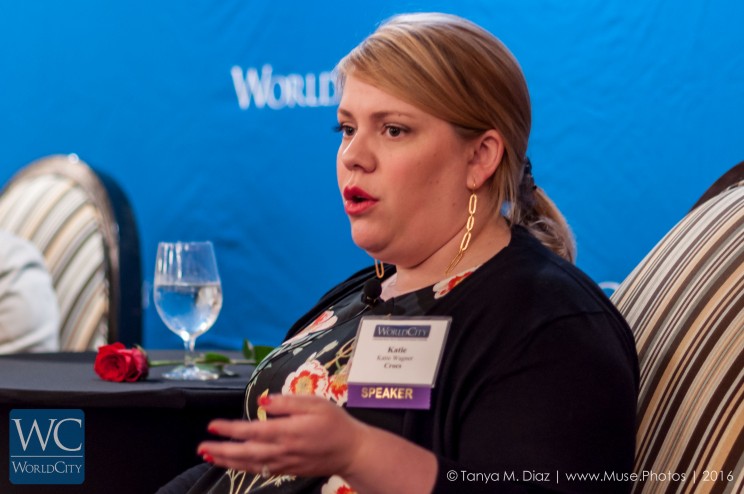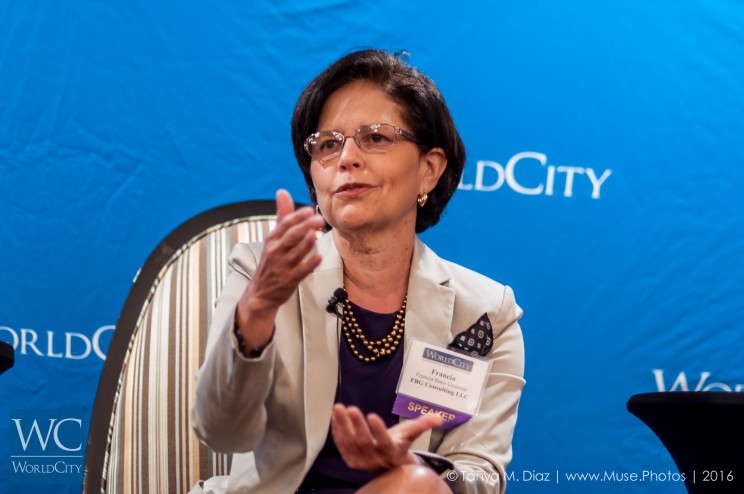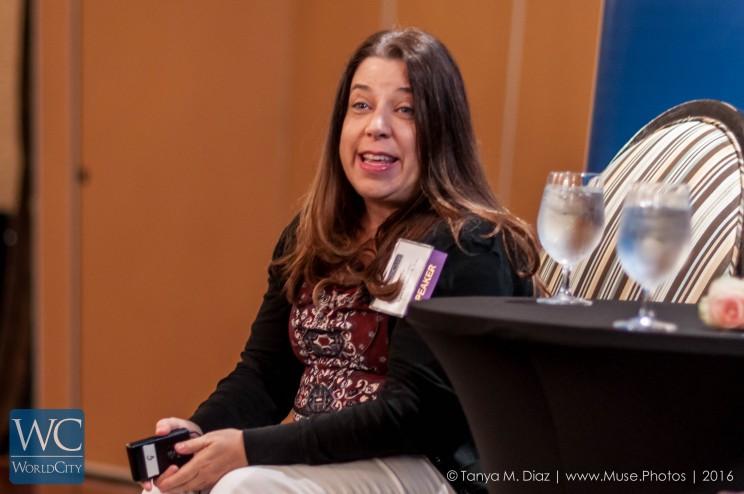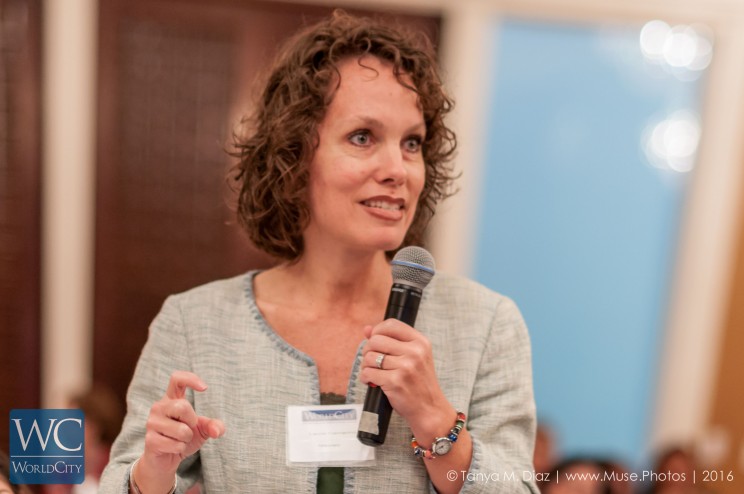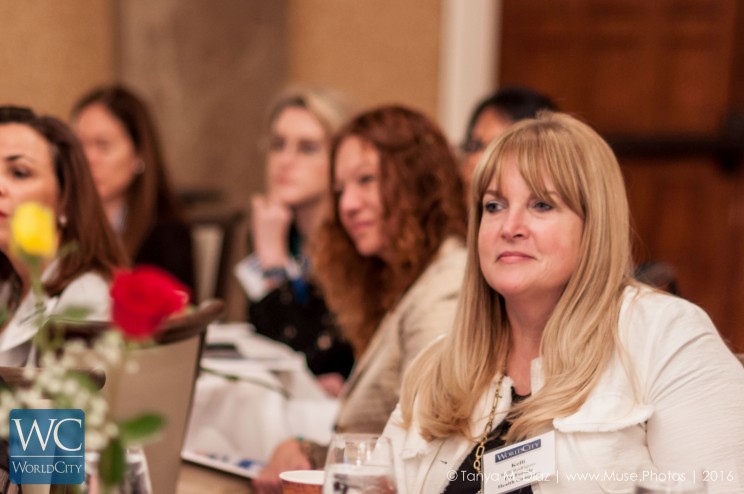Women Leaders: Disrupting the Status Quo
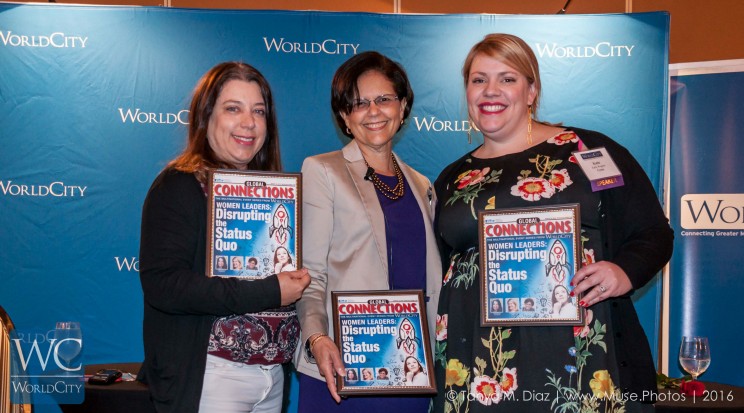
Status quo disruptors leading the discussion: Ronda Martinez of Levis, Francia Guzman of FBG and Katie Wagner of Crocs.
To understand what it’s like for women in the male-dominated corporate world, consider a meeting that executive Ronda Martinez attended. She took the team that she supervised to meet with their company suppliers. Martinez asked questions, but the male suppliers directed their answers to the men on her team and not to her, the decision-maker.
Ways to disrupt the status-quo and ensure a more inclusive workplace were the topic of WorldCity’s Global Connections event held March 18, 2016 in Coral Gables. More than 100 people took part.
Three female executives shared their experiences and views: Martinez, who handles logistics for cargo at clothing maker Levi Strauss & Co.; Katie Wagner, general manager for Latin America for shoe company Crocs; and Francia Guzman, former global head of engagement, diversity and inclusion at financial giant Visa and now chief of her own business, FBG Consulting.
WorldCity President Ken Roberts kicked off the session with questions about ways that men and women can use their strengths to help one another on the job.
“From a lot of male mentors, I was really able to find my courage to be more direct,” said Wagner.
Women, being “nurturing by nature …can teach men how to present a measure softer and more multi-dimensional,” helping to bring more viewpoints to the table and to show the broad group “what’s in it for them” by considering more diverse opinions, said Martinez.
Leverage the power of minorities
Greater inclusiveness is key, as the speed of change at workplaces accelerates, said Guzman. Today, many Baby Boomers are putting off retirement and working side by side with Millennials and even members of Generation Z, who are starting to intern after high school.
“There’s a new identity for minorities” including women, the LGBT community and others at the workplace, said Guzman. “We need to prepare today for the world we are going to face tomorrow… We need to value our minorities, and we need to leverage that.”
Network for support and advancement
What can help women and other minorities is networking among themselves, said Martinez. She chairs a women’s networking group at Crocs that helps women share their experiences and advocate for one another, “something that men do quite naturally,” she said.
Supportive husbands also matter. Many women have been unable to rise to top posts, because they can’t easily move their families to another city or country. Men traditionally have picked up the family and moved, relying on wives to handle child care. That’s harder for women to do, said Guzman.
More child care at workplaces and greater flexibility for working parents could help too. Often, moms drop out of work because of the high cost of child care and tough logistics to arrange it. Employers could ease the burden by letting people work remotely more often and on their own schedules, panelists said.
“Technology enables us to do that,” said Martinez. “Before you had to sit at your desk. Now, you can even be at the beach taking conference calls.”
Help men with work/life balance too
Men struggle with similar problems of work/life balance, but social expectations are different for them. Traditionally, it’s been assumed that men will give up family time to work hard and bring money home.
Facebook founder Mark Zuckerberg has focused attention on changing that. He took two months of paternity leave after the birth of his daughter in 2015, citing “studies show that when working parents take time to be with their newborns, outcomes are better for the children and families.”
The United States lags other countries in maternity and paternity offerings. It is one of the few countries in the world that does not guarantee paid maternity leave for employees, said Wagner.
“Nice Girls Don’t Get the Corner Office”
Women also need to speak up more, said Laura Camacho, director of human resources at MasTec. She referred to the book, “Nice Girls Don’t Get the Corner Office,” that shows how women often sabotage their careers. They tend to ask for less in negotiations than men do. And they wait until they’re 100 percent prepared before taking on a new job, while men dive confidently into new jobs with less preparation.
Of course, not all men or women fit the stereotypes. “We met men who are soft and nurturing and women who are bitches with heels,” said Guzman.
When her Visa job demanded travel as much as 42 weeks a year, Guzman said she relied on her husband to care for the family at home. And she suffered the ungrounded feeling that male road warriors often feel, even waking up in her own bed at home and wondering where she was.
How do you deal with feelings of guilt from being away from the family so much?, asked Nilda Bernal, project coordinator and office administrator for Caldwell Partners.
Think “10-10-10”
There’s a helpful book called “10-10-10” that suggests people make choices looking at the consequences in 10 minutes, 10 months and 10 years, Guzman said. That approach can help, for example, in deciding whether to go to an office meeting that’s really not critical or attend your child’s school activity.
“Most likely, people won’t remember you didn’t go to that board meeting,” said Guzman, while your child may cherish for a lifetime the photos you took of their play. Each choice can be made separately.
Women clearly remain a minority among executives at multinationals with offices in South Florida. Females make up just 12 percent of top executives at the 1,400-plus multinationals in the area, according to research for WorldCity’s latest Who’s Here directory.
What’s more, male “bosses” oversee about 40 percent more employees in South Florida than women bosses and about six times more globally, the directory showed.
What can women do to mentor young girls coming into the workforce to help reduce the gender gap?, asked, supervisor of account managers at C.H. Robinson Worldwide.
Try to bring networking groups to colleges and even high schools to boost the pipeline of women helping on another, suggested Martinez. Perhaps then, fewer women executives will have answers to their questions directed to their male staff and not to the boss herself.
Global Connections is one of four event series organized by WorldCity to bring together executives in greater Miami on international business topics. The Global series is sponsored by Florida International University’s School of Business Administration.
The next Global session is set for April 22, 2016 at 8 a.m. at the Coral Gables Country Club on the topic of the “Luxury Lifestyle in Latin America,” featuring executives from Tiffany & Co. and Bulgari Corp.
